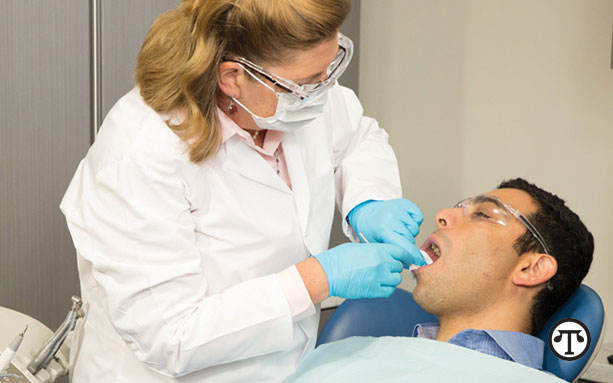
(NAPSI)—Nurse Sandy Wexler went to her dentist in 2012 for a routine teeth cleaning. During the exam, her dentist took a moment to feel the sides of her face, jaw and neck, looking for signs of oropharyngeal cancer—a type of cancer that occurs at the back of the mouth or top of the throat. Her dentist noticed an enlarged lymph node on the right side of Wexler’s neck and sent Sandy to see her physician.
It was metastatic squamous cell oropharyngeal cancer.
After weeks of radiation and chemotherapy at The University of Texas MD Anderson Cancer Center, Wexler was cancer-free. But had she not seen the dentist when she did, Wexler might not be alive today.
“I credit [my dentist] with saving my life because otherwise it could have been six more months before this could have been diagnosed and found,” she said.
The American Cancer Society estimates that there will be 51,540 new cases of oral cancer and oropharyngeal cancer diagnosed this year and 10,030 deaths from them. The U.S. Centers for Disease Control and Prevention (CDC) has noted that oropharyngeal cancer is on the rise.
As doctors of oral health, dentists see the mouth as a window to overall health and, as in Wexler’s case, can identify clues suggesting cancer.
This means more and more dentists are talking with patients about health issues that might at first pass seem unrelated but can actually affect oral health. Human papillomavirus (HPV) vaccination is one such topic. In fact, the American Dental Association has partnered with MD Anderson in an effort to improve public and professional education about the HPV vaccine and HPV-related cancers.
HPV vaccination was first discussed for its benefit in preventing cervical cancer in women, but there are other HPV-related cancers, including those at the back of the throat and the top of the mouth. The HPV vaccine can prevent infection with those strains of HPV responsible for 60 percent of oropharyngeal cancer cases. Because of this, consistent with the recommendation of the CDC, many dentists are now recommending both their male and female adolescent patients get the vaccine.
At your next dental appointment, don’t be surprised if your dentist checks for signs of oral and oropharyngeal cancer and talks to you about the benefits of the HPV vaccine. HPV vaccination can prevent cancers; a thorough exam for signs of oral and oropharyngeal cancers could save your life.
“Your dentist may check for signs of oral and oropharyngeal cancer and talk to you about the benefits of the HPV vaccine. HPV vaccination can prevent cancers; a thorough exam for signs of oral and oropharyngeal cancer could save your life. http://bit.ly/2HcvC3j”
